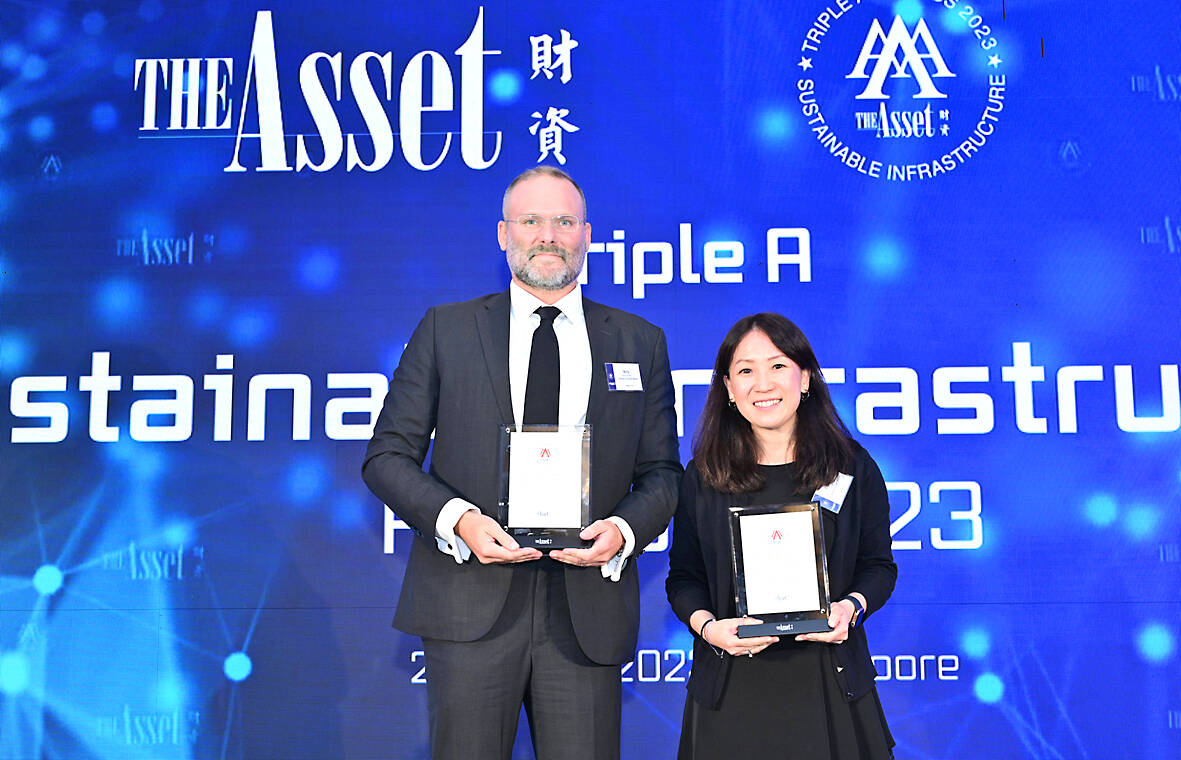Cathay United Bank (國泰世華銀行), the first bank in Taiwan to finance offshore wind and solar energy projects, on Monday won four awards — “Project Finance House of the Year,” “Renewable Energy Deal of The Year - Solar,” Renewable Energy Deal of The Year - Battery” and “Renewable Energy Deal of The Year - Wind” — from the well-known international financial journal The Asset Magazine, recognizing the bank’s contributions to renewable energy development and its financing initiatives for multiple sustainable energy projects.
“Cathay United Bank is relentlessly committed to achieving a sustainable financial sector,” bank executive vice president Michael Wen (溫珍瀚) said.
“With a strategy of paying equal attention to domestic and international projects, the bank is always exploring possibilities in the financialization of new energy technologies,” he said. “We are truly honored to receive four major awards from The Asset.”

Photo courtesy of Cathay United Bank
As the national trailblazer in green finance, Cathay United Bank has helped to develop the domestic green energy market and invested in global opportunities. Financing the construction of the largest wind farm in Vietnam — for which Cathay United Bank received the “Renewable Energy Deal of the Year Wind” award — was the first collaboration between a Taiwanese financial institution and the Asian Development Bank in project funding.
That marked a milestone for green energy investments by the nation’s banking industry in the Southeast Asian market and global investments generally.
In addition, Cathay United Bank has won accolades for contributing to the government’s fisheries and electricity symbiosis project in Chiayi County, through project financing with other domestic banks.
As one of the few Taiwanese financial institutions to receive acclaim from international media over renewable energy investments, Cathay United Bank has achieved a landmark in the nation’s project financing.
Furthermore, the bank accomplished a breakthrough in changing the nation’s pricing system for energy storage solutions by working in cooperation with experts, creating new financial models and joining forces with foreign partners.
Through these innovative approaches, Cathay United Bank assumed a leading role in financing Taiwan’s energy storage capabilities.
In striving toward realizing the government’s national renewable energy and New Southbound Policy goals, Cathay United Bank did not neglect to implement diversification of services, management internationalization and social responsibility. The bank’s strategy of innovation and leadership in green energy financing has won plaudits from the international banking community, as evidenced by the awards.
Last year, Cathay United Bank was recognized by The Asset for its offshore wind power project financing. This year, the bank once again received awards across three major categories — "Battery, Wind and Solar" as well as the "Project Finance House of the Year" from The Asset, with these accolades underscoring the bank's profound expertise in this field across a comprehensive spectrum.
The bank is to continue to utilize its experience in international collaboration to benefit the nation’s banking sector and take a leading role in the sustainable development of financial services.

NOT JUSTIFIED: The bank’s governor said there would only be a rate cut if inflation falls below 1.5% and economic conditions deteriorate, which have not been detected The central bank yesterday kept its key interest rates unchanged for a fifth consecutive quarter, aligning with market expectations, while slightly lowering its inflation outlook amid signs of cooling price pressures. The move came after the US Federal Reserve held rates steady overnight, despite pressure from US President Donald Trump to cut borrowing costs. Central bank board members unanimously voted to maintain the discount rate at 2 percent, the secured loan rate at 2.375 percent and the overnight lending rate at 4.25 percent. “We consider the policy decision appropriate, although it suggests tightening leaning after factoring in slackening inflation and stable GDP growth,”

DIVIDED VIEWS: Although the Fed agreed on holding rates steady, some officials see no rate cuts for this year, while 10 policymakers foresee two or more cuts There are a lot of unknowns about the outlook for the economy and interest rates, but US Federal Reserve Chair Jerome Powell signaled at least one thing seems certain: Higher prices are coming. Fed policymakers voted unanimously to hold interest rates steady at a range of 4.25 percent to 4.50 percent for a fourth straight meeting on Wednesday, as they await clarity on whether tariffs would leave a one-time or more lasting mark on inflation. Powell said it is still unclear how much of the bill would fall on the shoulders of consumers, but he expects to learn more about tariffs

Greek tourism student Katerina quit within a month of starting work at a five-star hotel in Halkidiki, one of the country’s top destinations, because she said conditions were so dire. Beyond the bad pay, the 22-year-old said that her working and living conditions were “miserable and unacceptable.” Millions holiday in Greece every year, but its vital tourism industry is finding it harder and harder to recruit Greeks to look after them. “I was asked to work in any department of the hotel where there was a need, from service to cleaning,” said Katerina, a tourism and marketing student, who would

i Gasoline and diesel prices at fuel stations are this week to rise NT$0.1 per liter, as tensions in the Middle East pushed crude oil prices higher last week, CPC Corp, Taiwan (台灣中油) and Formosa Petrochemical Corp (台塑石化) said yesterday. International crude oil prices last week rose for the third consecutive week due to an escalating conflict between Israel and Iran, as the market is concerned that the situation in the Middle East might affect crude oil supply, CPC and Formosa said in separate statements. Front-month Brent crude oil futures — the international oil benchmark — rose 3.75 percent to settle at US$77.01